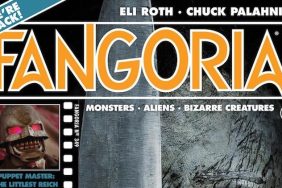So what’s it like to be in a filmmaking family? (Tony Gilroy wrote and directed Michael Clayton and wrote the Bourne series; John Gilroy is an editor of such films as Pacific Rim and Salt). Was everyone wanting to get in film early on?
No, none of us were trying to be a filmmaker early on. Tony, Johnny and I didn’t start on that until our late 20s. We were all pursuing other things. I started to write, Tony started to write and John started to edit. It’s been a 20-25 year process. Nothing happens overnight. What happens overnight? Nothing. If you want to be a screenwriter, great. But you have to be patient.
You’ve been in Los Angeles for a little more than two decades…
Where’d you come from?
Most recently Seattle. But I’ve lived a lot of places. So Los Angeles isn’t incredibly familiar to me, but seeing a movie set in LA can be jarring. Like Jake Gyllenhaal is sitting on his car in front of the Laundromat I use in Echo Park …
Oh yeah? There’s a beautiful view up the hill from there at Bob’s Market.
Yeah, it’s a surprise coming down Kensington and just seeing a big skyline emerge from this neighborhood.
It’s incredible.
When you watch films set in Los Angeles, do locations ever take you out of the film for a second?
I would answer you a little differently: we very much wanted to shoot Los Angeles in a way that you don’t usually see in films. Most of the films set in LA film it as desaturated, focusing on cement, downtown and manmade structures. The manmade element is not the spirit of LA. The spirit of LA is untamed wilderness. It’s earthquakes and wildfires and oceans and mountain lions and fog. There’s great physical beauty.
(Cinematographer) Robert [Elswit] and I wanted to capture the physical beauty of Los Angeles – almost like it’s a wildlife documentary. When we show the highway, we want you to think that you’re looking at a wilderness with all these animals moving through.
Related: Nightcrawler Review
My editor wanted me to ask, because Crave’s been a big supporter of Real Steel –
[smiles] Oh, really?
Is there anything going on with a sequel?
No. I haven’t heard anything. Shawn Levy has moved on to other things. I’m sure Hugh Jackman is busy. They’ve talked about doing it again. I think that the financial imperative is there. But there’s no update.
Why’d you make your directorial debut with Nightcrawler?
It’s personal because hopefully it’s an accurate portrayal of a world that’s extraordinarily troubled. I wanted to give my viewpoint on that. Also it was a manageable film to shoot. It was set in Los Angeles, which is where I live. It was an $8.5 million budget which took the pressure of me, because it wasn’t a $20 million budget, or – God forbid – a $50 million budget. It was a six-week shoot. Everything just came together.
What was your goal with Nina, Rene Russo’s character?
We all make choices with our backs against the wall that we might not make with our stomach’s full. I wanted her and Lou to be complex. I don’t think you can look at her and think she’s evil. She needs to do something to have an idea of job security. She needs job security to pay her rent and to keep her health insurance.
Thank you for giving Bill Paxton another slimeball role.
Oh yeah, he’s great in the movie.
He’s so good! He felt like his character from True Lies got older and was filming accidents now. He went from selling cars, to filming them burning, alone at night.
Or from Aliens. The off-putting marine.
Or Near Dark. In so many of these movies he feels like he is the first guy on the scene.
I know exactly what you mean.
Like Bill Paxton would figure out a new sleazy business, but someone else would perfect it.
[laughs] Yeah, yeah.

I was at the screening last night. I thought it was very funny.
Thank you.
I heard from a few folks last night and this morning that they felt bad for laughing, and I think that’s such a compliment, because it’s very hard to do. When you’re writing these creepy lines, I’m sure you’re aware that there’s humor there. But do you direct it humorously?
We never try to direct anything toward the comedy. Everyone told me that they laughed when they read the script. I always felt that there was an obvious level of absurdity in the script to what Lou was saying giving the context of what was going on. And I always wanted and expected laughs. I see this as an entertaining movie. And I hope it is.
It is.
The second is that it felt subversive. And I wanted to get people to think. And one way to get people to think is to use humor. Humor is a subversive form of communication because it activates certain parts of your brain that disarms you. So I was very happy to hear the audience laughing. To me that’s just music to my ears. I never directed to get a laugh, but if people are so engrossed in a story that that generates a laugh – I think that’s a terrific thing.
I saw a Q&A with Werner Herzog recently –
Oh, I’m a huge Werner Herzog fan. What a glorious human being.
And he said if an audience laughs they’re always correct. Even if they laugh where you never intended to get a laugh.
Has Werner Herzog ever said anything that wasn’t true? What a brilliant fountain of wisdom. Everything he touches I’m just fascinated by.
Brian Formo is a featured contributor on the CraveOnline Film Channel. You can follow him on Twitter at @BrianEmilFormo.







